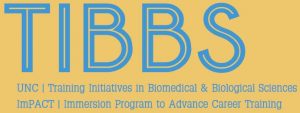Graduate Student Resources
Use the menus below to navigate through numerous resources available to graduate students. New students will find some of these resources particularly helpful.
TIBBS
Facilities
- Faculty and graduate students in the department are housed in Coker Hall, Fordham Hall, Wilson Hall, and the Genome Science Building. Student offices are generally located near their major adviser.
- Student mailboxes are located in Coker Hall. Mail should be addressed to your name at:
Department of Biology
CB# 3280, Coker Hall
120 South Road
University of North Carolina
Chapel Hill, NC 27599-3280. - The departmental fax number is (919) 962-1625.
- Keys for access to the outside doors and student offices in Biology buildings are assigned through Jason Worrell. Please contact him directly for more information.
- Conference rooms can be reserved online via our Room Reservation Request Form. Please make sure to review the departmental room calendar to check availability before making a request (you will be prompted to sign in with your ONYEN and password to access the calendar).
Libraries: Couch Biology Library – The science library annex in Wilson Library houses the majority of the on-campus collection of natural and mathematical sciences. for information, including locations and holdings of other libraries on campus, consult the UNC Libraries website.
Mental Health Resources
Please visit our mental health resources page for important information about your mental health and well being options.
Services
Computing Services: The Biology Department maintains various departmental IT services and resources. The BioHelp group (led by Hínár Polczer) assists faculty, staff and students with information technology related questions or requests. Help requests for computing problems should be submitted via the Help Desk. (under “Type of help needed”, select “Biology IT Support”).
Sending FedEx Shipments: If you need to send a package as part of your work with a laboratory, please ask for the assistance of your assigned lab’s manager. These staff members are the authorized representatives of the department to process all shipments.
Ordering supplies and reimbursement of out-of-pocket expenses: To order supplies, or to obtain forms for reimbursement of out-of-pocket expenses, contact your major professor (for research-related expenses) or course instructor (for TA-related expenses).
Departmental Visual Arts: The departmental visual arts are located on the third floor of Coker Hall. For requests, contact Susan Whitfield. You must provide a charge account number to use this service (get this number from your major professor).
NC Residency & Tuition Waiver
Out-of-state students are expected to obtain in-state residency as soon as possible because the University’s out-of-state tuition waiver funds are very limited in number. This means that it is helpful for students to do a few things as soon as they arrive in North Carolina. We strongly suggest that students obtain an NC driver’s license, register their car here, register to vote, actually vote in November, and perhaps join the public library (Carrboro/Chapel Hill). Students need to apply one year after they “set up residency” in NC (July or August after their first year). You should review the guidelines and on-line application for in-state status.
NOTE: You cannot get a NC license or register your car until you have valid car insurance. This often means getting insurance in the state and bringing proof of insurance with you.
To get your car registered, you will need to bring your license (and another ID), the title, and proof of insurance to the DMV registration place. There is one conveniently located at the corner of Elliot Drive and Franklin Street. They will then tell you to get your car inspected and get the inspection sticker, which you could do all at once if you drop your car off first at Chapel Hill Tire 942-8723 at University Mall (shopping center by Harris Teeter on Estes Drive) or at another inspection station of your choosing.
To get your license, you will have to take the eye test and NC drivers test on the computer, so reviewing the driving rules first is a good idea. The most convenient location is off of NC 54 bypass and NC 54 business (104 V Carrboro Plaza, 919-929-4161). Be sure to bring your old driver’s license, proof of your residence (lease, any bill/letter mailed to your new address with your name on it, etc), your insurance, and your checkbook. To be safe, check the ID options online and the NC DMV Newcomer’s guide for other helpful tips.
Financial Support (EEOB/QBio Students)
As a Biology graduate student, you will be provided a guaranteed 9-month stipend of a minimum of $20,000 and support throughout your graduate career as long as you remain in good academic standing. Through a combination of funding during the academic year as well as the summer, we will strive to provide you with a minimum annual stipend of $26,000. This minimum will be reviewed yearly to consider increases based on the MIT living wage calculator, representative apartment rents, and input from Biology graduate students. Several sources of stipend support are available.
Link to updated Biology Graduate Student Stipend Policy
EEOB students are supported by teaching assistantships, research assistantships, or fellowships (described in greater detail below) during the academic year and summer. It is very important that funding packages are discussed in detail during the recruitment process between the prospective advisor and student, and that realistic expectations of funding are shared.
Academic Year Funding:
During the 9-month academic year, you will be funded on either a teaching assistantship, research assistantship, or fellowship. Fellowships usually fund students on a 9-month or annual basis and vary in stipend amounts. Assistantships provide a minimum stipend of $10,000 per semester ($20,000 for the 9-month academic year). If your advisor does not have sufficient grant funding to fund you as a research assistant, then teaching assistantships will be available to you.
Summer Funding:
Our graduate students are funded during the summer and the goal is that they are funded on their advisor’s grants as research assistants. If the advisor does not have grant funding, teaching assistantships are available during both summer sessions. Each session lasts 5 weeks with a 20 hour per week average for teaching one lab or one recitation. Compensation for teaching one lab is $3575 and for teaching one recitation is $3250. We strive to provide our students with sufficient lab or recitation sections to reach $26,000 (two labs, two recitations, or a combination of the two). However, it is greatly encouraged that advisors provide grant funding to bridge any potential gap between summer teaching availability and $26,000.
SPECIFIC FUNDING OPPORTUNITIES
TAs help teach undergraduate courses and lead recitations and laboratories. A TA in Biology currently pays $10,000 per semester for a 9-month stipend of $20,000 (plus health insurance, tuition coverage, and student fees). The expected average workload for a TA during the academic semester is 20 hours per week or less.
There are orientation/training sessions sponsored by the Center for Faculty Excellence (CFE) for all new TAs. TAs must also attend a one-hour OSHA session offered by the Biology Department. TAs are evaluated by the course instructor(s) and students enrolled in the course. TAs are expected to receive satisfactory evaluations.
If funding permits, your advisor may be able to support you as a research assistant funded off of their grant. Duties vary, but it is generally expected that RAs will work 15-20 hours per week on grant-related work and be paid at a level comparable to a TA. Consult your advisor for details.
Fellowships are often the most desirable form of funding because they typically carry no service requirements. There are two main kinds of fellowships for beginning students. First are those offered by the UNC graduate school (for information, see the funding information page on the UNC graduate school website). Second, are those offered by external funding agencies, such as the National Science Foundation Graduate Research Fellowship Program. The Graduate Funding Information Center is a resource that assists current and prospective graduate students in finding appropriate funding sources. Through some of the funding databases, you can set up alerts to notify you when new opportunities are available based on information you provide.
A limited number of fellowships are also available to support continuing students. These fellowships are described in greater detail below. The UNC Graduate School holds an annual competition for a limited number of fellowships aimed at supporting advanced students (i.e., those who have been admitted to candidacy). Most are merit-based. For example, the Graduate School conducts competitions for one-semester Off-Campus Research Dissertation Fellowships and one-year Doctoral Dissertation Completion Fellowships.
For a complete listing of fellowships offered, visit the UNC Graduate School website.
As the departmental budget permits, several awards are offered annually through the Biology Department to help graduate students with research expenses (generally a few hundred dollars per year). The competition for these awards is normally announced in April.
In addition, the UNC Graduate School awards transportation grants. These grants cover travel expenses only and are available for doctoral and masters students presenting research papers at international, national, regional academic conferences or meetings of professional societies. Students may receive this grant only once. Applications are considered throughout the year and must be submitted prior to travel. For more information, visit the UNC Graduate School website.
PAYROLL AND BENEFITS INFORMATION
Teaching Assistants and Research Assistants are paid monthly for the academic year, usually beginning at the end of August and continuing through mid-May. Those who will be supported as Research Assistants during the summer will continue to be paid monthly, while those who will be supported as Teaching Assistants during the summer are paid at the end of each summer session. Students on University payroll are required to have their paychecks automatically deposited to their bank account by completing a direct deposit authorization form via ConnectCarolina. Students on Graduate School fellowships are generally paid in lump sums at the beginning of the semesters (and/or summer).
As part of your assistantship or fellowship, you will receive an award to cover your full tuition and mandatory student fees. Health insurance is also provided and your monthly premium is covered by your stipend’s funding source. You must remain fully enrolled and maintain good academic standing to qualify for your assistantship and the benefits outlined above.
Biology Graduate Student Aid Fund
This fund is intended to provide immediate, “stop-gap” financial support to Biology graduate students experiencing acute financial events, thus building community, aiding retention, and reducing time-to-degree. The department will not be dictating acceptable and unacceptable uses for the fund, but some categories are listed below:
- A medical emergency or expense (physical and mental health)
- Mechanical repairs (car, laptop, household, etc.)
- Temporary help if unable to meet welfare needs (food, housing, utilities, etc.)
- Assistance with moving or relocating
- Urgent transportation needs (flights, train tickets)
- Unexpected family care
- Visa/passport/legal documentation fees
Individuals can request up to $750 of aid per year (August through July schedule) split across a maximum of two separate requests, with awards ranging from a minimum of $100 to a maximum of $500 per request. In order to receive support, please fill out this Biology Graduate Student Aid Fund Application. Once you have submitted the application, please allow for 24-72 hours for your request to be approved and processed in GradStar. Please note that it can take up to 7-10 days from when the aid is processed in GradStar for it to be available in your account. You may contact Kenlyn Merritt or Logan Brackett if you have any questions.
Graduate Student Health Insurance
Graduate students with a Research Assistantship (RA), Teaching Assistantship (TA) or on Fellowship are eligible for the Graduate Student Health Insurance Program (known as GSHIP or the RA/TA health insurance plan), which is administered by Blue Cross Blue Shield NC. The policy year is August 1st-July 31st and students must meet the following enrollment requirements:
- Be registered as a full-time student
- Function as an active RA or TA, or be on a fellowship from the Graduate School
- External fellowship recipients are eligible as well if their stipend is at least $6500 for the policy year
Students are enrolled by the department each year prior to the start of the policy year. Biology’s Graduate Student Services Manager will provide all students with the enrollment form over the summer. For more information on plan benefits, please visit the BCBS website for the UNC-CH RA/TA plan. Under the plan benefits tab, you will find a Medical Benefits Summary as well as a Member Guide. This link will also provide additional resources, such as claim forms, HIPAA authorization forms, and link to registering for Blue Connect.
Dental insurance is currently not offered through the Graduate Student Health Insurance Program. However, dental care is offered in the Campus Health building by Campus-Smiles and Campus-Smiles has partnered with a low-cost dental plan. Please see more information regarding dental care on the Graduate School’s website.
Biology Graduate Student Association (BGSA)
The Biology Graduate Student Association (BGSA), organized by the Departmental graduate students, sponsors one or two seminar speakers each year, puts on an annual departmental symposium and departmental picnic, and organizes various social activities.
The BGSA would appreciate any input you have on happenings within the department! If you have any ideas for the departmental symposium, social activities, outreach activities, etc. please feel free to contact any of the officers below.
Visit our official website!
2023-2024 Officers:
- Co-Presidents: Stephanie Peak & Lorrie He
- Treasurer: Nicolas Frasson
- Secretary: Phu Zhang
- Web Manager: Stephen Mayer
- GPSG Representative: Indigo Edwards & Jadyn Sethna
- Faculty Representatives: Madelina Marquez
Living in Chapel Hill
Where to live: Most students live off-campus, and the options are numerous. There are a wide range of nearby apartments and townhouses located on bus lines into campus that are well within most students’ budgets. Some students decide to begin their stay in University housing. There are several dorms for graduate students and on-campus married student housing. Others rent townhouses or houses, and there are rentals in the surrounding countryside that provide rural living options. Below you will find links to campus maps as well as a housing guide compiled current Biology graduate students.
What to do:
After a long stretch of work in the lab, it’s always refreshing to walk up to Franklin Street to find an interesting place to enjoy some food and drink. Several places feature live music with a small cover charge or a “pass the hat” policy. Also located in downtown Chapel Hill are the Morehead Planetarium and the Ackland Art Museum. The ArtsCenter, also in Carrboro, showcases local companies or national touring groups in a 350-seat theater. The PlayMakers Repertory Company is a full-season theater group right in Chapel Hill with exciting performances. Further down the road, Walnut Creek is a major amphitheater with top name performers and several festivals. Just outside town is the N.C. Botanical Garden with extensive walking paths, and Duke Forest is a large area north of Chapel Hill with lots of trails. There are many local farmer’s and flea markets, including a large farmer’s market on Saturday mornings in nearby Carrboro.
The college spectator sports here are world-class. Student tickets are available for our exciting UNC Tar Heel men’s basketball and football games. Admission to most other games, such as men’s and women’s soccer, women’s basketball, lacrosse, and baseball, is free to students. Down the road the Durham Bulls provide great baseball entertainment on warm summer nights. The Carolina Hurricanes are a professional hockey team that play at their new stadium only 20 minutes from Chapel Hill. Local biking clubs provide strenuous activity as they explore the surrounding countryside. In short, it is likely that whatever your tastes and life-style, you will be able to find stimulating activities that are accessible in Chapel Hill.
And when it’s time to hit the road for a trip, you are only three hours by car from the North Carolina coast with its lovely and historic beaches, including Kitty Hawk, the site of the first heavier-than-air plane flight in the world. You are also only three hours east of the majestic Smoky Mountains, part of the Appalachian range. Smoky Mountain National Park and the Blue Ridge Parkway in the western part of the state offer truly stunning views of some of the oldest mountains in the world. And the large metropolitan areas of Atlanta, Georgia, and Washington, DC are only 4-5 hours by car. Raleigh Durham International Airport is ever-expanding to accommodate more travelers, and it is easy to fly almost anywhere from here. Chapel Hill has a moderate climate, with mild winters (snow is rare) and warm summers.
Transportation & Parking
All Chapel Hill buses are free. They have campus routes, so you may wish to use them as your primary mode of transportation. For schedules, check the Town of Chapel Hill Transit website.
There is an express bus to and from Duke University available to students and faculty. The schedule is found on the website. The Robertson Express Bus is operated by Go Triangle and riders need to present either a GoPass or pay the $3.00 fare when boarding. Please visit the Transportation and Parking website for more information on how to obtain a GoPass.
There are many bicycle racks to which you can attach (and lock) bicycles on campus and in town. You are encouraged to register your bicycle at the UNC Department of Public Safety. They have a brochure you may wish to get concerning bicycle use. If you don’t drive to campus, consider registering with the Commuter Alternative Program (CAP).
Harassment & Grievance Policies and Resources
Graduate Student Check-In Form
This form is meant to be open-ended to give you the flexibility to request help with issues or report on problems you are having with the program, your advisor, your committee, degree progress, or other aspects of graduate life here at UNC. While this form is not anonymous, if there is any information you prefer to keep confidential we will respect your wishes. However, if any potential incidents of discrimination, harassment, and related misconduct are revealed, we are required to report these to the Equal Opportunity and Compliance (EOC) Office. If you are experiencing discrimination or harassment based on any protected status, sexual assault or sexual violence, sexual exploitation, interpersonal violence, stalking, or retaliation, please consider making a direct report to the EOC Office and/or to our department’s grievance report form. The department’s grievance report form allows for anonymous submissions.
The Graduate Student Check-in Form is ONYEN protected.
Forms
There are a series of forms that are needed for tracking your degree progress. The majority of these forms are required by the Graduate School, while a few are required by our department. The Graduate Student Services Manager (GSSM) will compile the necessary forms for you and keep them on file. Once a milestone has been scheduled or completed, you must inform the GSSM. They will work with your committee and/or the DGS to acquire signatures and then submit the relevant form(s) to the Graduate School (unless the form is a departmental form; those will stay with the department). If you would like to have copies of the forms for your own documentation purposes, please let the GSSM know.
Graduate School forms (required for tracking your degree progress):
- Doctoral Exam Report Form: For recording when your qualifying exams and doctoral dissertation are completed
- Masters Comprehensive Exam Report: For recording when your qualifying exams and masters thesis are completed
- Report of Doctoral Committee Composition: For recording your doctoral committee
- Report of Approved Dissertation Project: For recording when you hold your feasibility meeting and your committee has approved your dissertation project
There are additional forms provided by the Graduate School that may or may not be relevant to you during your tenure in our program. These forms you can find here.
Departmental Forms
- Annual Committee Meeting: For when you hold your yearly committee meetings. When the meeting has commenced, please inform the GSSM so they can get the relevant signatures.
- Pre-Defense Meeting: For when you hold your pre-defense meeting. When the meeting has commenced, please inform the GSSM so they can get the relevant signatures.
If you have further questions about the above forms, please contact the Biology Department’s GSSM.
Graduate Program Committees
EEOB Graduate Studies Committee Members:

Willett, Christopher S.
Research Associate ProfessorDirector of Graduate Studies
willett4@email.unc.edu
EEOB Graduate Admissions Committee Members:

Willett, Christopher S.
Research Associate ProfessorDirector of Graduate Studies
willett4@email.unc.edu
QBio Graduate Studies Committee Members:

Willett, Christopher S.
Research Associate ProfessorDirector of Graduate Studies
willett4@email.unc.edu
QBio Graduate Admissions Committee Members:

Willett, Christopher S.
Research Associate ProfessorDirector of Graduate Studies
willett4@email.unc.edu
Quick Links:
- Program in Evolution, Ecology, & Organismal Biology
- Program in Molecular, Cell, & Developmental Biology
- Quantitative Biology Graduate Track
- How to Apply
- 2024 Graduate Student Appreciation Week Highlights












